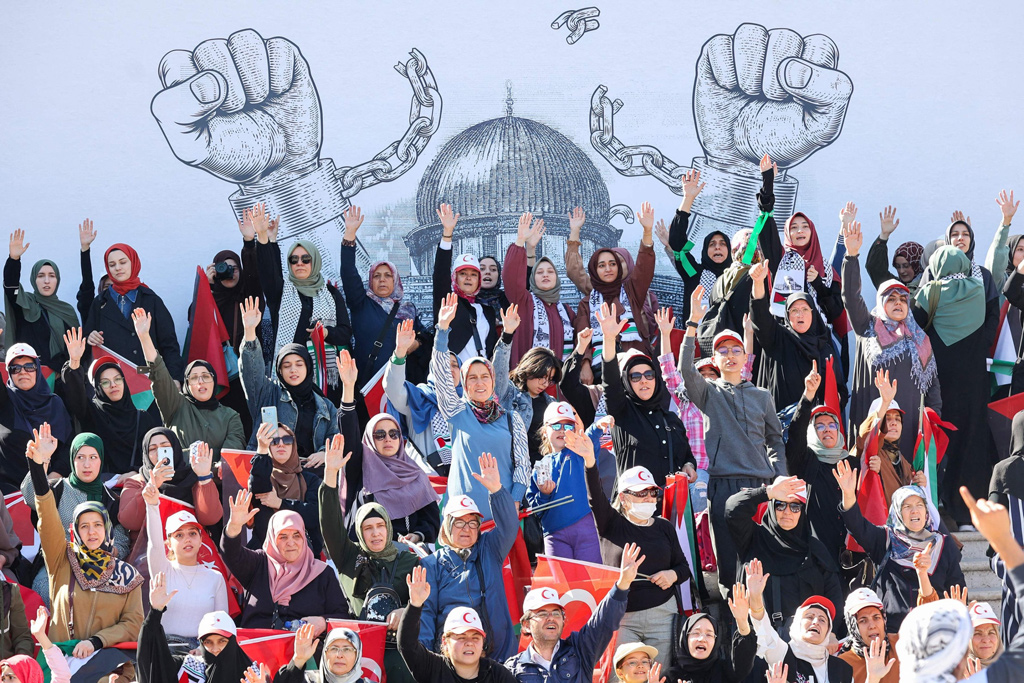U.S. change of stance

Mounting criticisms against Israel and Türkiye's peace diplomacy
Israel’s bombardment of Gaza has been underway for 12 days. Preparing for a ground operation, the Israeli army kills hundreds of Palestinians every single day. The strict blockade of Gaza, which prevents the delivery of humanitarian aid, has already rendered hospitals in the besieged Palestinian enclave unable to operate. As relief supplies pile up in Egypt, the tragedy in Gaza worsens. The following remark by Philippe Lazzarini, Commissioner-General of the United Nations Relief and Works Agency for Palestine Refugees in the Near East (UNRWA), best summarizes what is happening: “Gaza is being strangled, and it seems that the world right now has lost its humanity.”
Share
Israel’s bombardment of Gaza has been underway for 12 days. Preparing for a ground operation, the Israeli army kills hundreds of Palestinians every single day. The strict blockade of Gaza, which prevents the delivery of humanitarian aid, has already rendered hospitals in the besieged Palestinian enclave unable to operate. As relief supplies pile up in Egypt, the tragedy in Gaza worsens. The following remark by Philippe Lazzarini, Commissioner-General of the United Nations Relief and Works Agency for Palestine Refugees in the Near East (UNRWA), best summarizes what is happening: “Gaza is being strangled, and it seems that the world right now has lost its humanity.”
It is obviously Israel’s heavy bombardment and blockade that strangles Gaza. Ignoring calls for preventing civilian casualties and permitting the delivery of humanitarian aid, that country’s attitude elicits an increasingly strong reaction. It causes the international community’s views on the Israeli-Palestinian conflict to change. Israel faces growing criticism over its commitment to holding all Gazans accountable for the latest Hamas attacks. Critics also consider what Israel has done in the past as an occupier. Indeed, Russia and China describe Israel’s conduct as the collective punishment of Palestinians. Russian President Vladimir Putin has already drawn parallels between the Gaza blockade and the Siege of Leningrad during World War II.
U.S. President Joe Biden, who initially gave carte blanche to Israel, was also compelled to take the mounting criticism into consideration. In an interview on Sunday, he warned that it would be a mistake for Israel to occupy Gaza. Calling for the protection of civilians, Biden appointed a special envoy to address the humanitarian crisis and, despite supporting Israeli Prime Minister Benjamin Netanyahu’s push for complete destruction of Hamas, added that “there must be a path to a Palestinian state.”
The Biden administration changed its views for several reasons, including the international community’s growing reaction, the possible failure of Israel’s ground operation, the increasing likelihood of a regional war due to Hezbollah’s involvement and the Arab leaders facing mounting pressure at home over the killing of Palestinians.
Still, considering that the U.S. President identified himself as a Zionist in the past and his Secretary of State, Antony Blinken, reportedly told the Israelis that he was visiting their country as a Jew, Washington’s reference to Palestinian statehood remains extremely weak.
The whole world knows that the U.S. alone can stop Israel’s massacre of civilians and facilitate the delivery of humanitarian aid. Yet Washington currently focuses on containing the violence and preventing Israel’s possible failure. Hence its decision is to merely pay lip service to humanitarian challenges.
With Israel’s attacks on Gaza still underway, all countries in the region and the U.S. continue their diplomatic efforts. U.S. Secretary-of-State Antony Blinken visited the Arab capitals to hear about the dangerous repercussions of the humanitarian crisis in Gaza. Conducting meetings themselves, Iran’s diplomats consolidate the Axis of Resistance as Tehran signals its intention to join the fight, somewhere and somehow, if Israel indeed occupies Gaza.
Tags »
Related Articles







